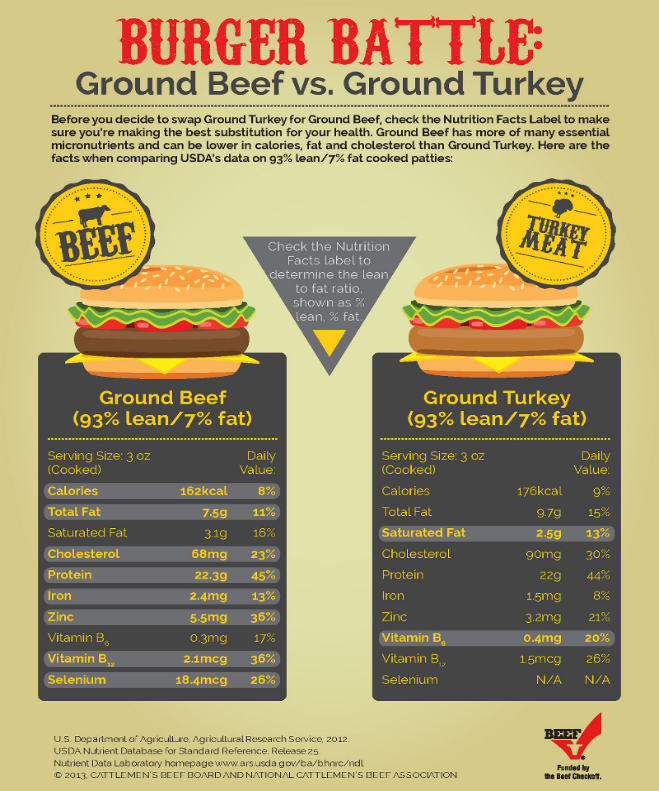By Mary McCabe Dietic Intern CUNY School of Public Health The benefits of eating lean beef far outweigh the myths on why not to eat beef. Beef is considered lean meat when a 3.5 oz (100 grams) serving of cooked beef has the following: 1) less than 10g total fat 2) less than or equal to 4.5g saturate...
By Mary McCabe
Dietic Intern CUNY School of Public Health
The benefits of eating lean beef far outweigh the myths on why not to eat beef. Beef is considered lean meat when a 3.5 oz (100 grams) serving of cooked beef has the following: 1) less than 10g total fat 2) less than or equal to 4.5g saturated fat 3) less than 95mg cholesterol. Beef contains excellent sources of nutrients that your body needs, such as Vitamin B12, zinc, selenium, iron, and Vitamin B6. In 3oz of beef you receive 10 essential nutrients that are about half of your Daily Value (DV) from protein. Beef nutrition comes in a small package packed with a large punch. For example, to receive the same amount of iron in 3oz of beef you must consume 8oz cooked chicken. Also, for zinc in 3oz beef you must consume 20oz cooked chicken. Overall beef gives your body more essential nutrients with small amounts.
Consumers do not realize that some cuts of beef are as lean as a 3oz skinless chicken thigh. All lean beef cuts have less than 10 grams of total fat, 4.5 grams or less than saturated fat and less than 95mg cholesterol per 3.5oz cooked serving. A 3oz serving of lean beef provides 25g of the DV of protein. Research studies show evidence that includes lean beef (95% lean) that is consumed daily as part of a heart healthy diet along with whole grains, fruits, and vegetables and increased physical activity decreases the risks of heart disease, and shows improvement in cholesterol levels. Consumers should not consume beef or meat that has been processed with added sodium and/or fat, such as cold cuts, that can lead to the increased risk of heart disease, cancer and other health complications.
The US produces the same amount of beef today with 33% fewer cattle as compared to 1977, and 18% of the world’s beef with only 8% of the world’s cattle. This is due to improved animal health and welfare, animal nutrition and animal genetics, and is supported through the Beef Quality Assurance Program. Ranchers and beef farmers depend on veterinarians and nutritionists to assist with this process of focusing on herd health and increased productivity. When humans consume a variety of whole grains, fruits, vegetables and lean proteins, it leads to less waste in landfills, and creates a sustainable global food system to provide for all.
Reference: New York State Beef Council

